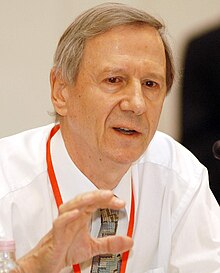
Back أنتوني غيدنز Arabic انتونى جيدنز ARZ Anthony Giddens AST Entoni Giddens Azerbaijani آنتونی قیدنز AZB Anthony Giddens Catalan Anthony Giddens Czech Anthony Giddens Danish Anthony Giddens German Άντονι Γκίντενς Greek
This biographical article is written like a résumé. (January 2023) |
The Lord Giddens | |
|---|---|
 Giddens in 2004 | |
| Born | Anthony Giddens 18 January 1938 London, England |
| Other names | Tony Giddens |
| Title | Director of the London School of Economics (1996–2003) |
| Political party | Labour |
| Academic background | |
| Alma mater | |
| Thesis | Sport and Society in Contemporary Britain (1961) |
| Academic advisors | David Lockwood |
| Influences | |
| Academic work | |
| Discipline | Sociology |
| Sub-discipline | |
| Institutions | |
| Doctoral students | Nigel Dodd |
| Notable works |
|
| Notable ideas | |
| Influenced | |
Anthony Giddens, Baron Giddens GCIH MAE (born 18 January 1938) is an English sociologist who is known for his theory of structuration and his holistic view of modern societies. He is considered to be one of the most prominent modern sociologists and is the author of at least 34 books, published in at least 29 languages, issuing on average more than one book every year. In 2007, Giddens was listed as the fifth most-referenced author of books in the humanities.[4][5] He has academic appointments in approximately twenty different universities throughout the world and has received numerous honorary degrees.[6]
Four notable stages can be identified in his academic life. The first one involved outlining a new vision of what sociology is, presenting a theoretical and methodological understanding of that field based on a critical reinterpretation of the classics. His major publications of that era include Capitalism and Modern Social Theory (1971) and The Class Structure of the Advanced Societies (1973). In the second stage, Giddens developed the theory of structuration, an analysis of agency and structure in which primacy is granted to neither. His works of that period, such as New Rules of Sociological Method (1976), Central Problems in Social Theory (1979) and The Constitution of Society (1984), brought him international fame on the sociological arena. The third stage of Giddens's academic work was concerned with modernity, globalisation and politics, especially the impact of modernity on social and personal life. This stage is reflected by his critique of postmodernity and discussions of a new "utopian-realist"[7] Third Way in politics which is visible in The Consequences of Modernity (1990), Modernity and Self-Identity (1991), The Transformation of Intimacy (1992), Beyond Left and Right (1994) and The Third Way (1998). Giddens' ambition was both to recast social theory and to re-examine our understanding of the development and trajectory of modernity.
In the most recent stage, Giddens has turned his attention to a more concrete range of problems relevant to the evolution of world society, namely environmental issues, focussing especially upon debates about climate change, analysed in successive editions of his book The Politics of Climate Change (2009); the role and nature of the European Union in Turbulent and Mighty Continent (2014); and in a series of lectures and speeches also the nature and consequences of the Digital Revolution.
Giddens served as Director of the London School of Economics from 1997 to 2003, where he is now Emeritus Professor at the Department of Sociology. He is a life fellow of King's College, Cambridge.[8] According to the Open Syllabus Project, Giddens is the most frequently cited author on college syllabi for sociology courses.[9]
- ^ Berger, Helen A. (1999). A Community of Witches: Contemporary Neo-Paganism and Witchcraft in the United States. Columbia, South Carolina: University of South Carolina Press. pp. xiii, 6. ISBN 978-1-57003-246-2.
- ^ McInnes, Colin J.; Roemer-Mahler, Anne (2017). "From Security to Risk: Reframing Global Health Threats". International Affairs. 93 (6): 1319–1321. doi:10.1093/ia/iix187. ISSN 1468-2346.
- ^ Waites, Matthew (2010). "Jeffrey Weeks and the History of Sexuality". History Workshop Journal. 69 (69): 262. CiteSeerX 10.1.1.1029.4950. doi:10.1093/hwj/dbq005. ISSN 1477-4569. JSTOR 40646109. S2CID 145387588.
- ^ Gill, J. (2009) Giddens trumps Marx but French thinkers triumph, Times Higher Education, 26 March 2009
- ^ Times Higher Education Most cited authors of books in the humanities, 2007, Times Higher Education, 26 March 2009.
- ^ Caves, R. W. (2004). Encyclopedia of the City. Routledge. p. 304.
- ^ Halpin, David, Hope and Education: The Role of the Utopian Imagination, Routledge, 2003, ISBN 0-415-23368-2, Google Print p. 63.
- ^ "UniSA honours influential social theorist Professor Lord Anthony Giddens". unisa.edu.au. Retrieved 19 September 2016.
- ^ "Open Syllabus". opensyllabus.org.
© MMXXIII Rich X Search. We shall prevail. All rights reserved. Rich X Search